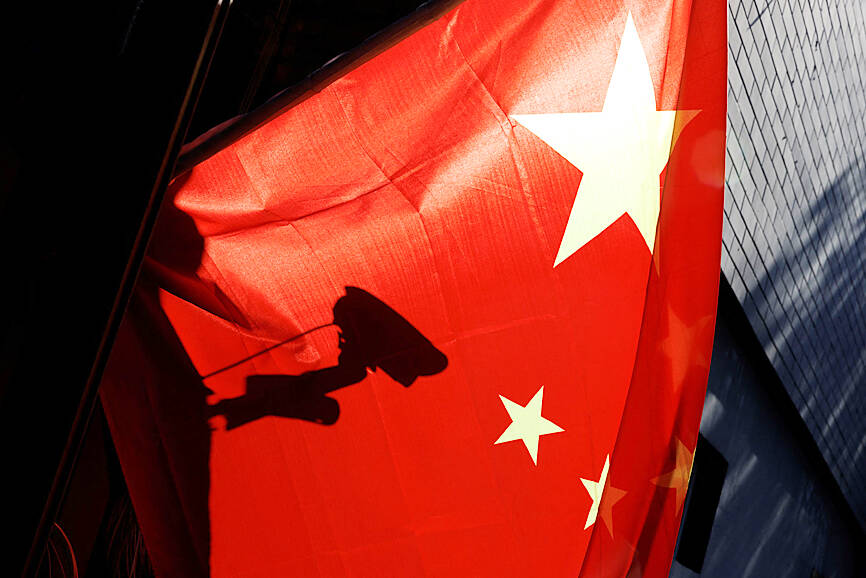A Democratic Progressive Party (DPP) legislator yesterday said he has submitted a bill that would stipulate penalties for certain espionage-related activities.
The National Security Act (國家安全法) does not stipulate penalties for participating in organizational activities on behalf of a foreign power, or the recruitment of people for such activities, DPP Legislator Wang Ting-yu (王定宇) said.
The bill would apply in situations such as the case of former army colonel Hsiang Te-en (向德恩) who was last year sentenced to seven years and six months in prison by the Kaohsiung District Court for accepting NT$560,000 in bribes from Chinese sources to work as a spy, Wang said.

Photo: Reuters
Hsiang had also signed a letter of surrender with the Chinese Communist Party (CCP), posing in a photograph with the document in military attire and pledging assistance, to the best of his abilities, in the event of an invasion.
Hsiang received a relatively lenient sentence because current laws do not stipulate penalties for contraventions such as pledging allegiance to an enemy and cooperating with an enemy in “united front” operations, Wang said.
“Hsiang’s case has ignited concerns at all levels about how the government should respond to Chinese infiltration,” he said.
In February last year, the Ministry of Justice invited the National Security Bureau, the Mainland Affairs Council, the Investigation Bureau and local prosecutors’ offices to discuss the matter, he said.
“Most of the officials who attended the discussion expressed their belief that to maintain national security, it must be illegal for even former military personnel to pledge allegiance to the CCP,” he said.
Article 2 of the National Security Act only prohibits “initiating, funding, hosting, manipulating, directing or developing an organization” for hostile foreign forces.
The bill would add participating in organizational activities to the act, he said.
The article also stipulates that those found “disclosing, delivering or transmitting confidential documents” may be sentenced to one to seven years imprisonment, while those found “collecting confidential documents” through espionage may be sentenced to between six months and five years.
The amendment would increase those sentences, because such acts could threaten the safety of national security personnel or the execution of their missions, or could result in the arrest of intelligence personnel, confiscation of property or destruction of facilities, which would harm national interests, he said.
The amendments would apply to military personnel or civil servants who use their authority to develop organizations on behalf of hostile foreign forces, he said.

CHIP WAR: The new restrictions are expected to cut off China’s access to Taiwan’s technologies, materials and equipment essential to building AI semiconductors Taiwan has blacklisted Huawei Technologies Co (華為) and Semiconductor Manufacturing International Corp (SMIC, 中芯), dealing another major blow to the two companies spearheading China’s efforts to develop cutting-edge artificial intelligence (AI) chip technologies. The Ministry of Economic Affairs’ International Trade Administration has included Huawei, SMIC and several of their subsidiaries in an update of its so-called strategic high-tech commodities entity list, the latest version on its Web site showed on Saturday. It did not publicly announce the change. Other entities on the list include organizations such as the Taliban and al-Qaeda, as well as companies in China, Iran and elsewhere. Local companies need

CRITICISM: It is generally accepted that the Straits Forum is a CCP ‘united front’ platform, and anyone attending should maintain Taiwan’s dignity, the council said The Mainland Affairs Council (MAC) yesterday said it deeply regrets that former president Ma Ying-jeou (馬英九) echoed the Chinese Communist Party’s (CCP) “one China” principle and “united front” tactics by telling the Straits Forum that Taiwanese yearn for both sides of the Taiwan Strait to move toward “peace” and “integration.” The 17th annual Straits Forum yesterday opened in Xiamen, China, and while the Chinese Nationalist Party’s (KMT) local government heads were absent for the first time in 17 years, Ma attended the forum as “former KMT chairperson” and met with Chinese People’s Political Consultative Conference Chairman Wang Huning (王滬寧). Wang

CROSS-STRAIT: The MAC said it barred the Chinese officials from attending an event, because they failed to provide guarantees that Taiwan would be treated with respect The Mainland Affairs Council (MAC) on Friday night defended its decision to bar Chinese officials and tourism representatives from attending a tourism event in Taipei next month, citing the unsafe conditions for Taiwanese in China. The Taipei International Summer Travel Expo, organized by the Taiwan Tourism Exchange Association, is to run from July 18 to 21. China’s Taiwan Affairs Office spokeswoman Zhu Fenglian (朱鳳蓮) on Friday said that representatives from China’s travel industry were excluded from the expo. The Democratic Progressive Party government is obstructing cross-strait tourism exchange in a vain attempt to ignore the mainstream support for peaceful development

ELITE UNIT: President William Lai yesterday praised the National Police Agency’s Special Operations Group after watching it go through assault training and hostage rescue drills The US Navy regularly conducts global war games to develop deterrence strategies against a potential Chinese invasion of Taiwan, aimed at making the nation “a very difficult target to take,” US Acting Chief of Naval Operations James Kilby said on Wednesday. Testifying before the US House of Representatives Armed Services Committee, Kilby said the navy has studied the issue extensively, including routine simulations at the Naval War College. The navy is focused on five key areas: long-range strike capabilities; countering China’s command, control, communications, computers, cyber, intelligence, surveillance, reconnaissance and targeting; terminal ship defense; contested logistics; and nontraditional maritime denial tactics, Kilby